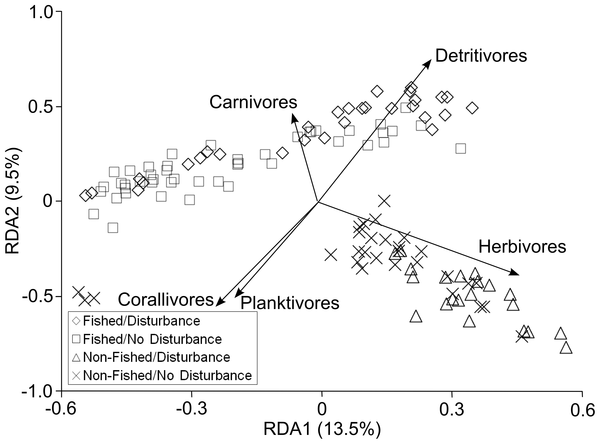Loss of sharks can have an impact that propagates down the food chain
Caught in the Middle: Combined Impacts of Shark Removal and Coral Loss on the Fish Communities of Coral Reefs
- Jonathan L. W. Ruppert
mail,
- Michael J. Travers,
- Luke L. Smith,
- Marie-Josée Fortin,
- Mark G. Meekan
Abstract
Due to human activities, marine and terrestrial ecosystems face a future where disturbances are predicted to occur at a frequency and severity unprecedented in the recent past. Of particular concern is the ability of systems to recover where multiple stressors act simultaneously. We examine this issue in the context of a coral reef ecosystem where increases in stressors, such as fisheries, benthic degradation, cyclones and coral bleaching, are occurring at global scales. By utilizing long-term (decadal) monitoring programs, we examined the combined effects of chronic (removal of sharks) and pulse (cyclones, bleaching) disturbances on the trophic structure of coral reef fishes at two isolated atoll systems off the coast of northwest Australia. We provide evidence consistent with the hypothesis that the loss of sharks can have an impact that propagates down the food chain, potentially contributing to mesopredator release and altering the numbers of primary consumers. Simultaneously, we show how the effects of bottom-up processes of bleaching and cyclones appear to propagate up the food chain through herbivores, planktivores and corallivores, but do not affect carnivores. Because their presence may promote the abundance of herbivores, the removal of sharks by fishing has implications for both natural and anthropogenic disturbances involving the loss of corals, as herbivores are critical to the progress and outcome of coral recovery.

Media coverage:
- University of Toronto: http://www.news.utoronto.ca/overfishing-sharks-harming-coral-reefs
- The Australian (Newspaper): http://www.theaustralian.com.au/higher-education/shark-fishers-deprive-coral-of-an-ally/story-e6frgcjx-1226722280405
- The Guardian: http://www.theguardian.com/environment/2013/sep/19/coral-reefs-suffer-hunt-sharks
- The Conversation Op-Ed: http://theconversation.com/killing-sharks-is-killing-coral-reefs-too-18368
- Australian Broadcasting Corporation (ABC) Radio: http://www.abc.net.au/am/content/2013/s3851888.htm
- CBC Quirks and Quarks: http://www.cbc.ca/quirks/2013/09/18/the-soup-that-killed-the-reef/
- CBC Radio Canada International: http://www.rcinet.ca/en/2013/09/23/canadian-study-shows-sharks-important-for-coral-reef-ecosystems/
- The Economist
- NPR Academic Minute
More… PLoS ONE, 8(9): e74648. doi:10.1371/journal.pone.0074648
